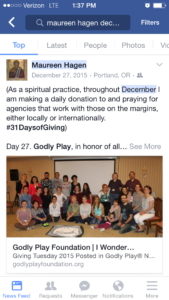with Maureen Hagen
by Jeannie Babb
“I love living into the Advent story every year. I am currently thinking about the Prophets and what they told us about what it means to listen to God’s word.”
For Maureen Hagen, Director for the Academy for Formation and Mission in the Episcopal Diocese of Oregon, listening and living into the story leads to giving. As part of her own spiritual practice, Hagen follows 30 Days of Gratitude in November, with 31 Days of Giving each December.
A Godly Play storyteller since 2003, Hagen says her Godly Play practice informs her approach to Christian formation as a whole, and generosity in particular. Whether teaching, giving, or supporting in other ways, she spends time first in prayer, then listening, wondering, response.
“In December’s Facebook posts, I respond by giving money. Other times I may give time, or pray.”
Originally from New York, Hagen was ordained as a deacon in the Diocese of Oregon in 2004, and is now the incoming president for the Association of Episcopal Deacons. She began 31 Days of Giving as a way to be more thoughtful and intentional her giving. She wanted to institute a spiritual practice rather than responding in a busy or hurried fashion at the end of the year.
Each day in December she identifies one ministry that is doing Christ’s work in the world. “It may not necessarily be a Christian group,” she notes. She draws on the Baptismal covenant to decide who will receive donations: “They must maintain the dignity of every human being. That is a criteria, because some groups use their aid as a weapon, or have a litmus test for those they will help.”
Hagen often uses Charity Navigator to help her vet larger organizations. While some charity watch dogs focus only on financial aspects, Charity Navigator considers whether the organization is nepotistic and how much goes to direct service. Hagen says these tools help, but personal knowledge is even better. Only larger organizations appear in Charity Navigator’s database. The Godly Play Foundation, for instance, did not make their radar, but still makes Maureen’s. 
“Another criticism of tools like Charity Navigator is that the percentage of funds going direct isn’t the whole picture.” In some organizations, the people themselves are the ministry, so a larger portion goes to salaries. She says, “If you know what the organization is doing, and you have personal access to those who lead it, you can have greater confidence in your gift.”
After identifying a ministry, Hagen listens to their story. “Why did they start their ministry? How did God call them? How are they helping alleviate suffering or providing hope?” Having entered their story, she wonders how to join them in their ministry, and then responds with her gift. In her 31 Days of Giving, Hagen shares the result of this process with others in a series of FaceBook posts. She also provides a link to each ministry she supports, for those who want to learn more or make their own donation.
As a veteran of the Peace Corp, deployed to Morocco, Hagen is partial to overseas ministries and their ability to stretch a dollar. One of her favorites are Midwives on Missionary Service (MOMS) delivering babies and providing women’s health care in Sierra Leone. “If you support women, you will bring about the greatest change. Fifty dollars can do a lot in northwest Africa.”
Through her own church, Christ Church Episcopal Parish in Lake Oswego, OR, Hagen has developed relationships in Ika and Arequipa, Peru. For thirty years, Health Bridges International has been attending the health needs of children there. Hagen traveled to Peru last summer and saw the work that the church has been supporting. She also noticed many children did not have uniforms, preventing them from fully participating in school programs. She learned that the cost for both winter and summer uniforms is US$45 per student. “There are 110 children in these orphanages. That’s under $5,000 to outfit them all.” Now Hagen is raising money for uniforms through the church’s Advent tree. “They have food. They have housing. Health Bridges provides their medical care – but this, wearing the uniform and having full participation in their education – this is part of their dignity.”
 Noting that it is also important to support U.S. ministries, Hagen alternates foreign and domestic support during her 31 Days of Giving. One day this December, she plans to support the Standing Rock Sioux Tribe.
Noting that it is also important to support U.S. ministries, Hagen alternates foreign and domestic support during her 31 Days of Giving. One day this December, she plans to support the Standing Rock Sioux Tribe.
Hagen’s Facebook posts are part of her response to the story — the story of Advent, the story of her own baptism, and the story of each ministry. Rather than merely pressing a button or writing a check, she spends time researching the organization, listening, and wondering about her own place in their story. Then she responds by praying, giving, and retelling the story. It’s not unlike what happens in the Godly Play circle.
On this Giving Tuesday, as many of us consider our own practice of giving, we invite you again into the circle, to hear the story, to practice wonder, and to share the work of Godly Play.
###


Thank you, Jeannie, for such a lovely piece. You are quite gifted at what you do. With a looming deadline you got so much in – I am very impressed. (One small note: I was ordained in 2004.)
I especially loved how you integrated this so well into the theology and praxis of Godly Play.
May you have a blessed Advent season.
Peace and Joy,
Maureen